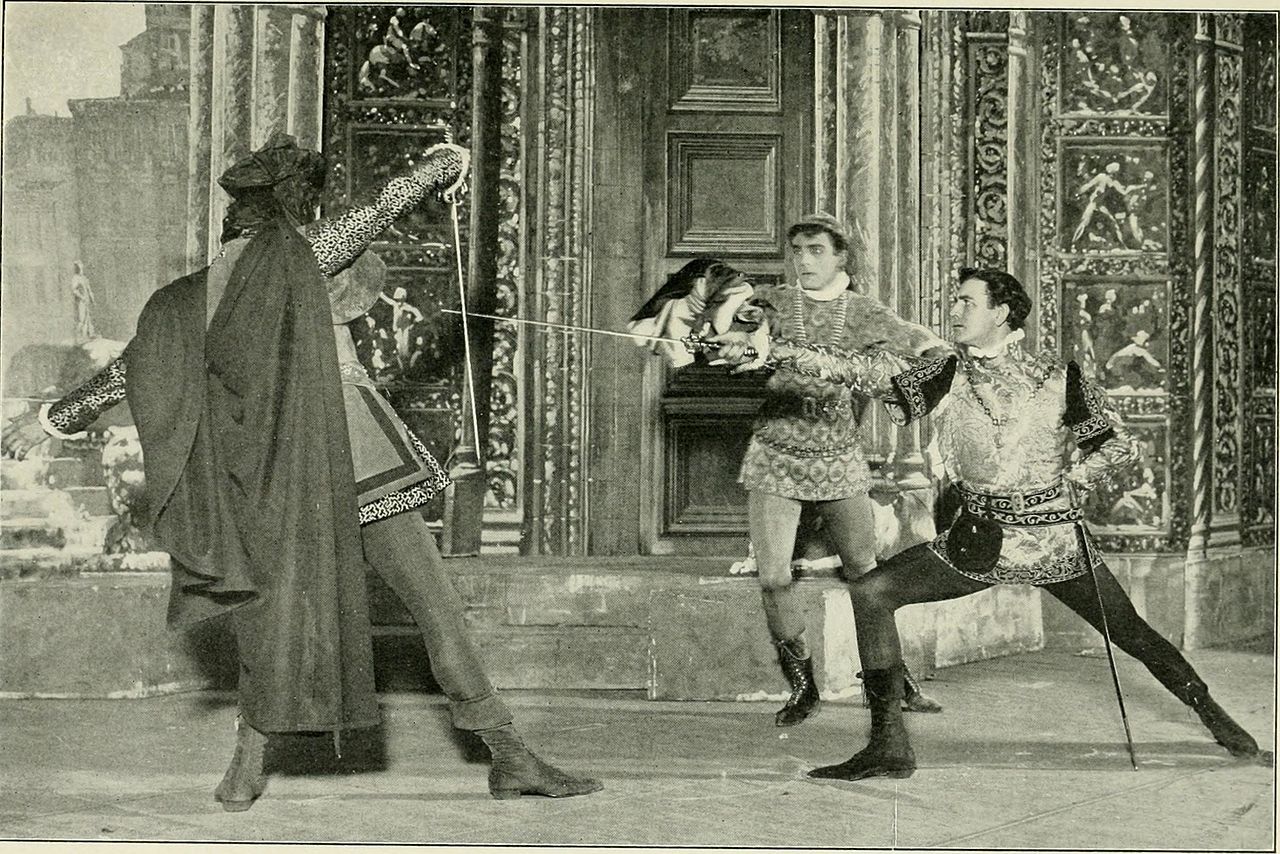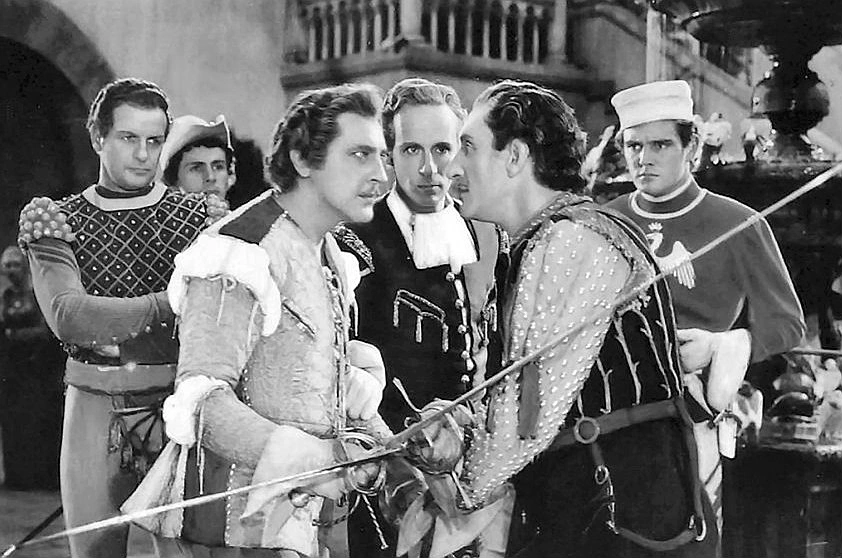Character Analysis of Tybalt Capulet in Romeo and Juliet by Shakespeare
Cousin of Juliet Capulet, adept duelist, and Prince of Cats, Tybalt Capulet is a hot-headed young man who values violence and impulse over peace and insight. The rivalry between the Montagues and Capulets accentuates Tybalt’s hatred for the Montagues and highlights his macho and aggressive personality. Tybalt Capulet himself symbolizes the anger and revenge that fuel the dissonant relationship between the two antagonistic families. Yet, Tybalt also has some good qualities, including his undying loyalty to the Capulets and immense skill at the sword. Tybalt plays an important role in the story of Romeo and Juliet through several key events in the plot: Tybalt’s murder of Mercutio, Romeo’s revenge for Mercutio by killing Tybalt, Romeo’s subsequent banishment from the city, and ultimately, the two star-crossed lovers’ suffering and deaths.

How is Tybalt Characterized in Romeo and Juliet?
As a foil of peace-maker Benvolio and known for being impetuous and cantankerous, Tybalt intentionally kills Mercutio and shows no regret in defeating Mercutio in the manner of stabbing him under Romeo’s arm. Likewise, his killing of Mercutio under Romeo’s arm is not accidental, and Tybalt would have liked to defeat Mercutio in this manner. Throughout the story, Tybalt is characterized as an impulsive, peace-hating man. During the first fight between the Montagues and Capulets, Tybalt exclaims that he hates the word, “‘[peace]/As I hate hell, all Montagues, and thee./Have at thee, coward!’”(Act I, Scene 1, lines 68-69). Unlike Benvolio, who tries to create peace and stop the first fight, Tybalt encourages the fight and does not hesitate to join in. From his speech, Tybalt is portrayed as quarrelsome and violent, wishing ill will for the Montagues and creating more mayhem as he quickly participates in the fight. His action of immediately starting to fight also demonstrates his trait to be impulsive. Often, Tybalt rushes into action based on his rash thinking to simply attack and kill all Montagues or anyone in his way. Because he has the characteristics of aggressiveness and petulance, it is conspicuous that he would most likely intentionally kill Mercutio with his impulsive mindset to kill.

Tybalt Kills Mercutio: Death Scene in Act III
Also, since Mercutio has insulted him before Mercutio’s death, Tybalt, who has huge pride for both the Capulets and himself, becomes furious and is more aroused to brutally kill Mercutio no matter what it takes to hurt him. Consequently, when Romeo intervenes fighting Tybalt and Mercutio, Tybalt takes this open chance to stab Mercutio. Although his defeat of Mercutio has partially come from Romeo’s unfortunate move, Tybalt would have liked the way he has defeated Mercutio because he has accomplished what he had in mind: to kill. Therefore, because Tybalt is portrayed as impulsive and violent, his killing of Mercutio is most likely to be intentional, and he would have liked to kill him through his stab under Romeo’s arm.

Tybalt’s Death by Romeo’s Hands leads to Romeo’s banishment from the city
In Romeo and Juliet’s Act 3 Scene 1, Tybalt stabs Mercutio in the streets of Verona. In anger, Romeo takes revenge and kills Tybalt. Romeo Montague is punished for killing the Capulet. “That banishment is worse than the murder of ten thousand Tybalts.” The death of both Mercutio and Tybalt and the banishment of Romeo reminds us of Mercutio’s warning and foreshadowing earlier “A plague o’ both your houses” (3.1.87) as Mercutio dies.

Feline good? Did you enjoy our Purrrfect Character Analysis and Review on Our Good Boy Tybalt? Please leave us a like/Comment Below! 😉
© Copyright 2019 Moosmosis – All rights reserved
All rights reserved. This essay or any portion thereof
may not be reproduced or used in any manner whatsoever
without the express written permission of the publisher.
Please Like our Facebook page to support! 🙂
Categories: education, humanities, Literature














Excellent analysis of Romeo and Juliet! Very funny cute kitties! 😀
LikeLiked by 2 people
Thank you Athena! 😉 Much appreciated your kindness.
LikeLiked by 1 person
You’re furrrrry welcome! 😀
LikeLiked by 2 people
Enjoyed your purrfect analysis of Tybalt Capulet!
LikeLiked by 2 people
Thank you Peerrrrr-cy! 😉
LikeLiked by 1 person
Funnnnnyyyy I see what you did there! 😀 Wooooot
LikeLiked by 1 person
yourrrrrrrr welcome!
LikeLike
😸
LikeLiked by 2 people
Thank you K! 😸 Hope you enjoyed our Tybalt analysis!
LikeLiked by 1 person
🐶
LikeLiked by 1 person
I ❤️ It!
LikeLiked by 2 people
Like!! Really appreciate you sharing this post.Really thank you! Keep writing.
LikeLiked by 1 person
Appreciating the persistence you put into your site and detailed information you present. It’s good to come across a site every once in a while that isn’t the same out of date rehashed information. Excellent read! I’ve saved your site and I’m adding your RSS feeds to my Google account.
LikeLiked by 2 people
Really great. Short but very accurate information… Thanks for sharing this one. A must read article!
LikeLiked by 2 people
Thank you HSBC! Glad you enjoyed the article. Happy learning!
LikeLiked by 1 person